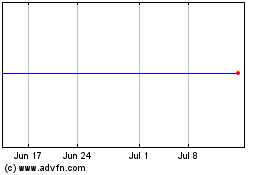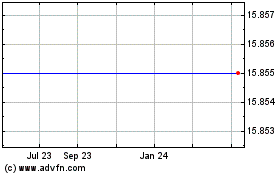EpiPen Maker Executive to Testify at House Hearing
September 14 2016 - 11:20PM
Dow Jones News
WASHINGTON—Lawmakers have summoned the top executive from EpiPen
maker Mylan NV to Washington for a hearing next week to explain
substantial price increases for the emergency allergy treatment
that have generated widespread consumer outrage.
The company confirmed Wednesday that Chief Executive Heather
Bresch will come to Capitol Hill Sept. 21 to testify before the
House Oversight and Government Reform Committee in a hearing likely
to feature intense questioning about Mylan's pricing strategy.
Politicians from both parties have been racing to find ways to
lower health-care costs in light of the EpiPen controversy. Some
say the issue combines the ingredients needed to bridge the
partisan divide on health care: price spikes in a lifesaving
treatment used by children coupled with growth in high-deductible
plans that have increased consumers' exposure to treatment's price
tags.
Mylan already has said, amid the criticism, that it will launch
a half-priced generic version of the medicine and increase rebates
available to some consumers.
But many members of Congress see potential action by the
government as necessary. Some have asked the Food and Drug
Administration why rivals of the emergency allergy product can't
quickly get approved and provide competition to drive down its
cost.
A few legislators have said the agency has to go further and
regulate the price of lifesaving drugs.
The FDA has declined to comment.
Sens. Tammy Baldwin (D., Wis.) and John McCain (R., Ariz.), plan
to introduce a bill requiring drugmakers to give a 30-day notice
and justification to the Department of Health and Human Services of
any prescription drug price increase of more than 10%.
The hearing announcement Wednesday came from both the
committee's chairman, Jason Chaffetz (R., Utah.) and its top
Democrat, Elijah Cummings of Maryland, in a sign of bipartisan
interest in the issue.
Another twist to Mylan's visit to Capitol Hill is that Ms.
Bresch is the daughter of a Democratic senator, Joe Manchin of West
Virginia.
The Wall Street Journal reported this week that the company had
the second-highest executive compensation among all U.S. drug and
biotech firms during the past five years.
Lawmakers say they think their various proposals to reduce
health-care costs—some of which were born of earlier drug-pricing
outcries— have had a big boost from their EpiPen-mobilized
constituents.
"We really do have the opportunity to have these patients be
advocates in bringing public pressure to bring down health-care
costs," said Rep. Ami Bera, a California Democrat, who has called
on the FDA to regulate the prices of lifesaving drugs. "You are
seeing how quickly electeds on both sides of the aisle are rallying
around the EpiPen issue."
The spread of high-deductible health insurance in
employer-sponsored plans and the ones that people buy alone has
increased consumers' engagement because they have to pay many costs
upfront and out-of-pocket before their coverage kicks in,
health-care economists say.
About 40% of people under the age of 65 are in a high-deductible
health plan, according to new data from the Centers for Disease
Control and Prevention released last week. That is up from 25.3% in
2010.
Exposure to costs can prompt consumers to cut back in spending
on discretionary items. But when confronted with a must-have drug,
especially one used by children, it appears to have had a different
effect: turning some into activists to attack health-care
costs.
"When you're paying $20 as a copay nobody looks at what the
thing costs," said James Baker, head of Food Allergy Research &
Education, a patient advocacy group. "This is the first thing that
really has hit people. The fact is that it's a kind of
life-or-death thing."
Some experts, though, said it was too soon to call the EpiPen
controversy a turning point in consumer-driven activism.
Tom Miller, a resident fellow at the right-leaning American
Enterprise Institute, said that while individuals having "skin in
the game" could change their behavior in relation to health-care
costs, that theory didn't apply to the tens of millions of
Americans over the age of 65 in Medicare, or younger enrollees in
low-deductible private plans and Medicaid, the federal-state
program for the poor.
Peter Loftus and Jonathan D. Rockoff contributed to this
article.
Write to Louise Radnofsky at louise.radnofsky@wsj.com
(END) Dow Jones Newswires
September 14, 2016 23:05 ET (03:05 GMT)
Copyright (c) 2016 Dow Jones & Company, Inc.
Mylan NV (NASDAQ:MYL)
Historical Stock Chart
From Mar 2024 to Apr 2024

Mylan NV (NASDAQ:MYL)
Historical Stock Chart
From Apr 2023 to Apr 2024
